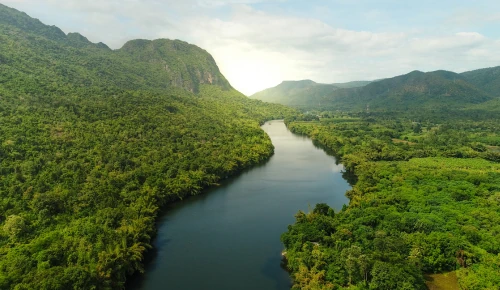Rivers are a vital resource for our planet. They play a crucial role in the environment and the economic development of communities. In this article, we will explore why rivers are important and what benefits they provide.
Introduction
Rivers are natural bodies of water that flow towards a larger body of water. They are created by precipitation, surface water flow, and underground aquifers. Rivers are dynamic, and as they flow, they change their shape and form. They can be shallow or deep, wide or narrow, slow-moving or fast-moving. They are essential for the planet’s survival, and we will explore why below.
Importance of Rivers
Environmental Benefits:
Rivers are crucial for maintaining the planet’s biodiversity. They provide habitats for aquatic plants and animals, such as fish, amphibians, and insects. Rivers also play a vital role in the water cycle, moving water from the land to the oceans and back to the land again. They help to prevent soil erosion and reduce the risk of flooding.
Economic Benefits of Rivers:
1. Water for life: Rivers provide fresh water for drinking, cooking, cleaning, and other essential needs. This water supports communities and businesses.
2. Growing food: Farmers use river water to irrigate their crops, which increases food production and provides food security.
3. Clean energy: Rivers can be used to generate electricity through hydropower plants. This is a clean and renewable source of energy.
4. Transportation: Rivers provide a natural waterway for transporting goods and people, which can be cheaper and more efficient than land transportation.
5. Fishing and tourism: Rivers support a variety of fish and other aquatic life, which can be harvested for food or enjoyed by tourists. This creates jobs and generates income.
6. Recreation: Rivers offer opportunities for swimming, boating, fishing, and other recreational activities, which can boost the local economy.
7. Ecosystem services: Rivers play a vital role in filtering water, controlling floods, and providing habitat for plants and animals. These services are essential for maintaining a healthy environment.
In short, rivers are valuable economic assets that provide essential resources, support various industries, and contribute to the overall well-being of communities.
Cultural Benefits:
Rivers have significant cultural and spiritual importance to many cultures worldwide. Rivers are also a central focus for many celebrations and festivals worldwide. In India, Hindus worship rivers as goddesses.
Threats to Rivers
Unfortunately, rivers are under threat from pollution, climate change, dam construction, and overuse. These threats can severely impact the environment, economy, and communities that depend on them.
Pollution
Contamination from industrial and agricultural activities can have a severe impact on rivers. Polluted water can harm aquatic life, reduce water quality, and make it unsafe for human consumption or recreational activities.
Climate Change
Climate change can also have adverse effects on rivers. Rising temperatures can alter river flow patterns, cause increased water evaporation, and lead to water scarcity in some areas.
Dam Construction
While dams provide benefits such as hydroelectric power and irrigation, they can also have a detrimental impact on rivers. Dams can cause a reduction in water flow, disrupt biodiversity, and reduce sediment flow downstream.
Conclusion
In conclusion, rivers are vital for the planet’s survival. They provide an essential resource for the environment, economy, and culture. However, they are also under threat from human activities such as pollution, climate change, and dam construction. We must protect and conserve these precious resources for the benefit of future generations.
FAQs
How do rivers help the environment?
Rivers play a critical role in maintaining biodiversity, preventing soil erosion, and reducing the risk of flooding.
What is the economic importance of rivers?
Rivers provide communities with an essential resource for transportation, irrigation, and power generation.
Why are rivers important culturally?
Rivers have significant cultural and spiritual importance to many cultures worldwide.
What are the threats to rivers?
Rivers are under threat from pollution, climate change, dam construction, and overuse.
How can we protect rivers?
We can protect and conserve these precious resources by reducing pollution, managing water use more sustainably, and taking action to address the impacts of climate change.
